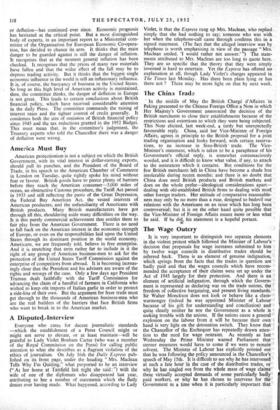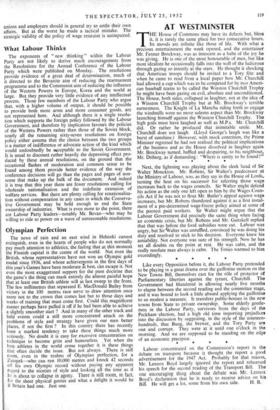The Wage Outcry
It is very important to distinguish two separate elements in the violent protest which followed the Minister of Labour's –decision that proposals for wage increases submitted to him by twelve wage councils in distributive trades should be referred back. There is an element of genuine -indignation, which springs from the facts that the trades in question are badly paid and that the wages councils which have recom- mended the acceptance of their claims were set up under the Act of 1945 largely for their protection. And there is an element of artificial indignation, through which the Govern- ment is represented as declaring war on the trade unions, the freedom of collective bargaining, and present living standards. Sir Walter Monckton does not look or behave like a class- warmonger (indeed he was appointed Minister of Labour because of his gift for understanding and conciliation) and quite clearly neither he nor the Government as a whole is seeking trouble with the unions. If the unions cause a general explosion on the labour front it will be because their own hand is very light on the detonation switch. They know that the Chancellor of the Exchequer has repeatedly drawn atten- tion to the need for wage restraint. As recently as last Wednesday the Prime Minister warned Parliament that sterner measures would have to come if we were to remain solvent. The Minister of Labour has explicitly pointed out that he was following the policy announced in the Chancellor's speech of May 15th. It is difficult to see why he has intervened at such a late hour in the case of the distributive trades, or why he has singled out from the whole mass of wage claims these virtually accepted demands of some particularly badly paid workers, or why he has chosen to intervene for the Government at a time when it is particularly important that unions and employers should in general try to settle their own affairs. But at the worst he -made a tactical mistake. The strategic validity of the policy of wage restraint is unimpaired.



































 Previous page
Previous page